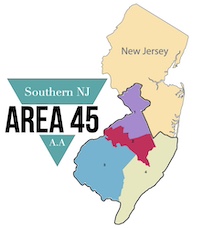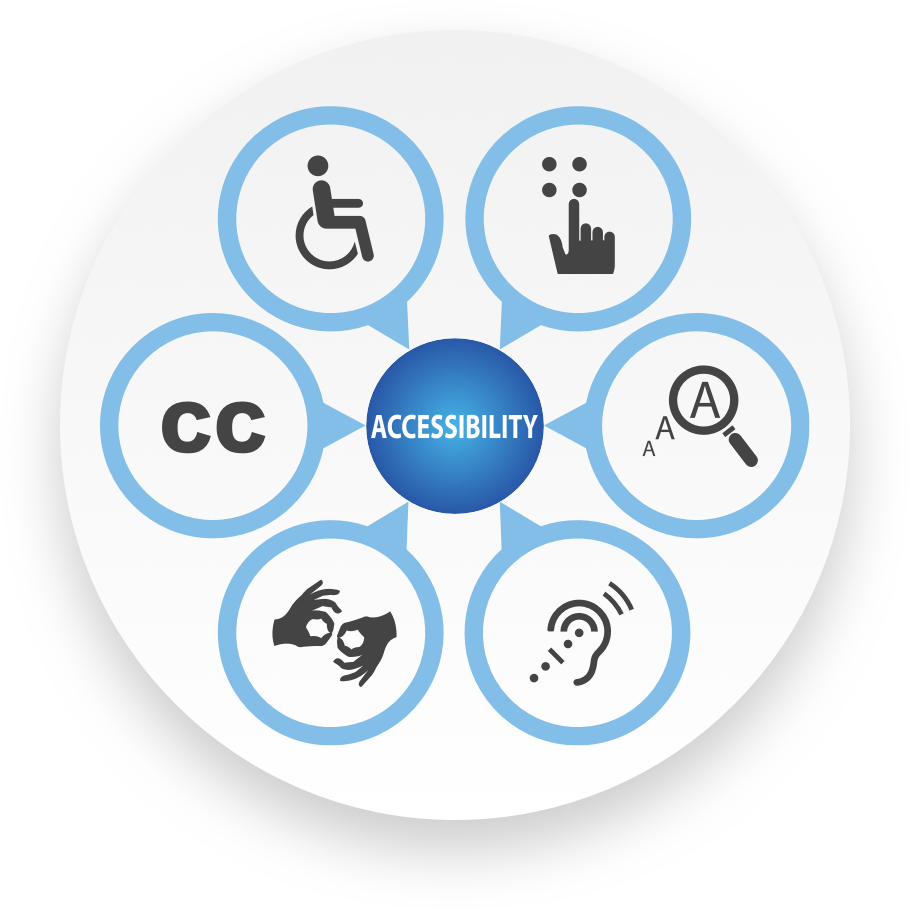
Many current and future A.A. members are:
blind/visually impaired
deaf/hard of hearing
homebound or chronically ill
confined to assisted living/nursing homes
physical accessibilities challenged
language/learning barriers
Area 45 Accessibilities Committee serves to help improve access to the program of Alcoholics Anonymous to problem drinkers who encounter obstacles receiving our message, accessing meetings/events in our Area.
This page is dedicated to helping both the A.A. Member and the GROUP, with ways to overcome these obstacles.
Contact Area 45 Accessibilities Chair, Pat McN or Co Chair Amanda P.
Email: accessibilities@snjaa.org
ACCESSIBILITY RESOURCES for MEMBERS
A.A. World Services has created our materials in video and audio format, providing a way for those with a AUDIO or VISUAL DISABILITY to access our literature.
Resource Example:
The Big Book of A.A. is available online in 3 ways: READ - WATCH - LISTEN.
Members can listen to audio files of the chapters. CLICK HERE
Twelve Steps and Twelve Traditions
The book explains the 24 basic principles of Alcoholics Anonymous. Known as the "Twelve and Twelve,” the book dedicates a chapter to each Step and each Tradition. available online in 3 ways: READ - WATCH - LISTEN. CLICK HERE
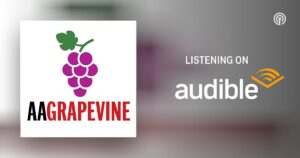
AA Grapevine YouTube Chanel:
Playlists available from deaf members in ASL. VIEW VIDEOS
No member should experience isolation in our program of recovery. There is a solution for an A.A. member who is unable to attend A.A. meetings because of physical incapacity related to illness or residency at an assisted living facility or tour of service.
Resource Examples:
A.A. Correspondence Service - Loners Internationalists (LIM) publishes a bulletin and facilitates communication between isolated members. There are two services offered, supported by the GSO: LEARN MORE
- Members can sign up to receive a bi-monthly copy of the confidential bulletin Loners Internationalists Meeting (LIM) that seeks to unite in fellowship, many isolated members. The bulletin contains excerpts from submitted letters from LIM members.
- Additionally, members can join The Loners-Internationalists & Homers Directory which is printed annually and lists all active LIM members, who can sponsor and support one another.
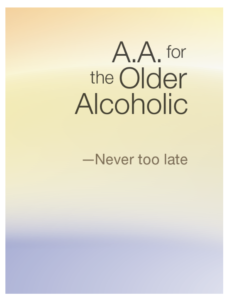
A.A. for the Older Alcoholic - This booklet will acquaint you with some A.A. members from a wide variety of backgrounds who have had diverse experiences with alcohol. What they have in common is that each of them came to grips with their alcoholism in their 60s and 70s. They began drinking at different periods in their lives and drank for various lengths of time. READ BOOKLET
Members who are developmentally disabled, have a learning or other mental challenge, need not feel left behind.
The term “neurodivergence” can include those with Autism, ADHD, Dyslexia, OCD, Down Syndrome and Tourette syndrome to name a few.
Resource Examples:

Plain Language Big Book
The Plain Language Big Book is a tool to help readers understand the book Alcoholics Anonymous. This new book is designed so that the A.A. Twelve Step program of recovery from alcoholism may be easily understood and accessible by all people who have a desire to stop drinking.
Neurodivergence Call for Sharing Questions/Survey
GSO has been receiving increased inquiries from members on how to better communicate the A.A. program to members with neurodivergence. Your help is needed TAKE THE SURVEY.
All the responses received will be forwarded to the Treatment and Accessibility GSO Staff Member, who will compile them for the Treatment and Accessibility 2025 Conference Committee.
- Language barriers are overcome with access to meetings in many languages.
- Audio barriers are overcome with closed captioning provided via on-line meetings.
- Physical disabilities are overcome with meetings designated with wheelchair accessibility.
Resource Examples:
The A.A. 12 Step Meeting Guide gives access to meetings via a mobile device, where similar filters help visitors find meetings with accessibility needs met. MORE INFO
Local Meeting lists in New Jersey provide information categories(filters) to help locate meetings that meet your needs. Search these sites: Cape Atlantic Intergroup, Central Jersey Intergroup, South Jersey Intergroup. Online Intergroup of A.A.
Helpful Links:
Espanol - Officina Intergrupal Hispana de A.A. sur de New Jersey - www.aaintergruposurnj.com
Polish - Polska Intergrupa w USA "Wschodnie Wybrzeże" - https://polskaintergrupa.org/
AA Grapevine YouTube Chanel - Playlists available playlists available in English and Spanish. VIEW VIDEOS
Check list for Your Meeting - Is your meeting Accessible?
CALL TO ACTION
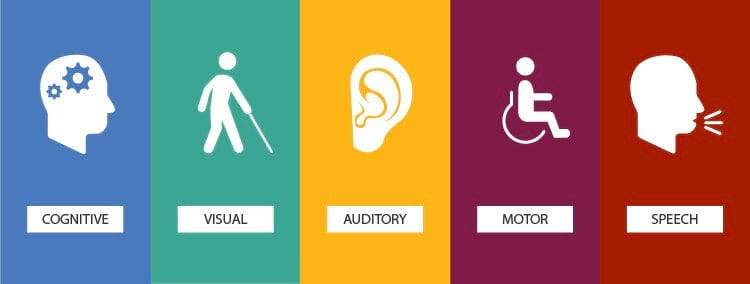
How you can help!
The Area 45 Accessibilities Committee is working on these items...can you help?
- Looking to compile a list of bilingual members to help carry the message as needed.
- A plan is forming to help carry the message of recovery/meetings to Assisted living facilities, nursing homes and the homebound. Let us know if you are interested.
- Looking for people willing to help those who are unfamiliar with technology and needing to do virtual or telephone meetings get up and running.
- We seek individuals willing to connect by phone or mail with a person in recovery who is homebound.
TIPS:
-Let us know if someone needs assistance or your meeting needs accessibility.
-Consider asking your District to have an Accessibilities point person.
REACH OUT:
Contact Area 45 Accessibilities Chair, Pat McN or Amanda P. - Email: accessibilities@snjaa.org
Attend the Area Committee Meeting
The Accessibility Committee meets on the 3rd Thursday of the month @ 7 p.m.
Please join to learn more about our service work.
Join Zoom Meeting
https://us02web.zoom.us/j/85352512630?pwd=MUtjN2tVTkRjL0xyWnc5dWQ5OUVsdz09
Meeting ID: 853 5251 2630
Passcode: 626374
Accessibilities Survey
Are there barriers to accessing A.A. we can address....in our literature, our meetings?
How can we make A.A. easier for anyone with a disability?
Please take this survey and help the Accessibility Committee hear your voice.
RESOURCES FOR GROUPS
Group Checklist
The General Service Office published an Accessibilities Checklist to help groups determine the overall accessibility of their meeting space.
View the list and share this information at your next business meeting.
The following is sharing from a longtime A.A. member who is also an American Sign Language (ASL) interpreter:
“In conversations with A.A. members who are interested in helping a Deaf person it is vital to treat the Deaf person with the same warmth as you would any other person who is new to A.A. or a visitor to your group. For example:
Greet the person with a handshake.
Escort the person to the coffee service area and offer them coffee or a soft drink if available.
Write a note telling them that you and the group are happy they are here.
When the meeting is finished give the person a newcomer packet, if available, or some literature and a meeting schedule.
“I also suggest becoming familiar with our literature on accessibilities and making sure that the group keeps such literature on-hand, and in a format that a person who is Deaf can use.
“I have recently asked several A.A. members if they would like to learn more about helping the Deaf person and learning some ASL. They are enthusiastic about the idea so I have been listing some items to cover in a future workshop:
- Discuss the literature available for Deaf alcoholics, including service material and recent Grapevine issues featuring Accessibilities articles.
- Show a portion of the ASL video, ‘Alcoholics Anonymous.’
- Learn signs such as: A.A., sober, alcohol, problem, love, better, improve, serenity prayer, number signs 1 through 12, sobriety date, happiness-joy-sober, jail, hospital, time, one day, pay attention, hope, sponsor, meeting leader, peace, ask, etc.
- Ask a Deaf person to share their experience, strength, and hope regarding any obstacles they may have faced in receiving the A.A. message.
- Suggest using 3x5 cards for the Steps and prayers from Alcoholics Anonymous.
- Include Deaf people on the workshop committee.”
Another member who is Hard-of-Hearing shared additional suggestions to facilitate communication that can help at both service and recovery meetings:
“Members can arrange meeting room chairs in a circle, not in straight lines. The more faces I can see, the better I can ‘hear’ the speakers. The better the lighting is in the room, the better I can see lips to read them. You can tap me lightly on the shoulder before you start to talk to me. In a group setting, you can occasionally tell me who is talking, or what the topic of conversation is. You can signal me if I start to speak while someone else is talking. You can turn off the fans to eliminate background noise.”
Sources:
A.A. Grapevine, September 2010
Page 10 of the Accessibilities Workbook
Extending the hand of A.A. to older alcoholics can offer hope to a population that is all too frequently isolated and fearful. The support and recovery that membership in A.A. brings can be the doorway to a new life — regardless of one’s age.
Alcoholism in older adults has been called the “invisible epidemic.” It has been estimated that up to 10 percent of the elderly adult population meet the criteria for alcohol abuse or dependence, but healthcare providers often mistake symptoms of alcoholism for dementia, depression or other problems.
Even when they ask for help, many older adults have difficulty getting to A.A. meetings; they may have trouble driving or walking, and shrinking social networks can sometimes mean that fewer friends are available to help them.
This is why elderly outreach programs have become so important within Alcoholics Anonymous.
The A.A. message can also be carried to professionals at social service agencies assisting elders, as well as elder care facilities, including retirement and convalescent homes. Many A.A. members reach out to elder alcoholics within one’s group, including those who need assistance getting to the meeting and participating in the meeting as well as those who become homebound. And remember, some of those elder alcoholics who need assistance may have long-term sobriety and can serve as valuable resources for the group – as sponsors and keepers of A.A. tradition and experience.
A.A. for the Older Alcoholic - This booklet will acquaint you with some A.A. members from a wide variety of backgrounds who have had diverse experiences with alcohol. What they have in common is that each of them came to grips with their alcoholism in their 60s and 70s. They began drinking at different periods in their lives and drank for various lengths of time. READ BOOKLET
Source: Page 11 of the Accessibilities workbook
Getting to meetings and participating in other service-related A.A. activities can be difficult for parents with primary childcare responsibilities or those who have other caregiving responsibilities, such as taking care of a sick parent or family member. Accessibilities Committees can support such A.A. members in a number of ways:
Organize and conduct local workshops on childcare at meetings;
Research any legal issue that might be involved in setting up child-friendly meetings;
Work with the local intergroup/central office to develop a list of meetings where kids are welcome or childcare is available;
Develop a list of A.A. members willing to participate in phone meetings with parents/caregivers who cannot attend meetings in person;
Provide single parents or other caregivers with a list of internet meetings.
Source: Page 13 of the Accessibilities Workbook
Many A.A. members live in underserved or remote communities — communities that are difficult to reach because of the geography, language or culture. It might be a community that is far away, or one that is right around the corner; one that is comfortable using English-language resources or one that is not. It could be any number of groups of people who have frequently been underserved.
In areas where these populations are not being reached, Accessibilities Committees may support such A.A. members in a number of ways:
Organize regular telephone/teleconferencing/video conferencing meetings with members in remote communities for both recovery and service meetings;
Coordinate with C.P.C./P.I. committees to develop and access communication vehicles in these communities, such as radio and television services, which can help carry the message to underserved communities or remote locations;
Identify familiar community resources within specific ethnic and cultural communities (such as local media outlets, places of worship, medical providers, social clubs, schools) and coordinate with C.P.C/P.I. committees to provide such culturally-significant targets with PSAs, A.A. literature and information;
Identify individual community leaders in ethnic/cultural communities and coordinate with C.P.C./P.I. efforts to provide them with basic information about A.A. and establish ongoing communication;
Make sure there is an A.A. presence in underserved areas — consider starting meetings in communities where none exist;
Work directly with existing members in underserved communities to take regular A.A. meetings onto Native American reservations, into inner city communities, special language enclaves, remote areas, or help set up online meetings and mobile collaborations;
Insure that A.A. members in remote areas are aware of the Loners/Internationalist Meeting (LIM), which prints correspondence from A.A. members in isolated areas, at sea, or home- or hospital-bound;
Keep local members informed regarding Regional or Local Forums or other A.A. service events that may be occurring in their areas;
Provide regular reports — in accessible formats — of service workshops, district meetings, and other service information that will help keep these areas connected to the whole of A.A.
Source: Page 14 of the Accessibilities Workbook
Simply getting to a meeting can be the biggest problem for the alcoholic who is Blind or whose eyesight is compromised. Intergroup/central offices and Accessibilities Committees often maintain lists of members who are willing to provide transportation to and from meetings and other A.A. functions. Some groups have asked their local intergroup/central offices to code Twelfth Step lists to identify such members.
It is helpful for the group to assign volunteers to guide newcomers who are Blind or visually impaired to chairs, the hospitality table, and rest rooms until they are familiar with the surroundings. Meeting rooms should always be set up the same way consistently, or if not, Blind members or those with visual impairments should be alerted to any changes. Banging into a chair or table that wasn’t there at an earlier meeting can be both dangerous and embarrassing.
One group’s experience illustrates what can be done to help any alcoholic not only get to meetings regularly but also to become a full participant in the group. The chairperson asked for volunteers to take a young Blind man to meetings once a month; the volunteers were assigned specific dates, and if they couldn’t take their turn, they were responsible for finding a substitute. The response was immediate and generous, and the young man is now able to attend all group meetings and participate fully in group activities. As a result of this twelfth-stepping, group members have drawn closer to their Blind friend, going beyond what used to be just a few niceties at meetings to really get to know him as another recovering alcoholic. “We have all benefited,” says one member.
Such experience can be applied to welcoming all alcoholics who face personal barriers to receiving the A.A. message and participating in A.A. service opportunities: a handshake and a friendly greeting are a good start, but we can’t stop there if someone is going to feel a part of our Fellowship.
Source: Pamphlet F-107 Serving all Alcoholics - Making the A.A. Message Accessible
Some physically challenged A.A.s can get to meetings; others cannot. For those who have difficulty walking or who are in wheelchairs, fellow members can drive them to and from meetings, install wheelchair ramps over steps to the meeting room, and arrange the room so that there is ample space for wheelchairs or walkers. Check that nearby parking is available and verify that rest rooms are truly accessible, with ample room to maneuver within the confines of the room or stall. Most local meeting lists are coded to indicate meetings which are held in wheelchair accessible facilities.
Taking a meeting to a chronically ill member who is homebound can make a tremendous difference to him or her. The experience of one area’s Accessibilities Committee tells the story well: “In the front of the meeting schedules, we enclose a notice headed, We Are Not Alone Anymore Group: ‘This group is for homebound members. We would like to bring a meeting to you. There are no special alcoholics, though there are alcoholics who have additional personal barriers to receiving the A.A. message. The We Are Not Alone Anymore Group believes that when anyone, anywhere, reaches out for help, the hand of A.A. will be there.’ We list our phone number and encourage homebound members to call for help. We also ask A.A.s who are not living with disabilities to volunteer their services.”
Another area set up a “mobile group.” The chair reported: “Volunteers will carry a regular meeting to members housebound for lengthy periods of time. The traveling unit will consist of a chairperson, a leader, coffee and cookies, a few camp-type folding chairs, and no collection plate!”
Source: Pamphlet F-107 Serving all Alcoholics - Making the A.A. Message Accessible
